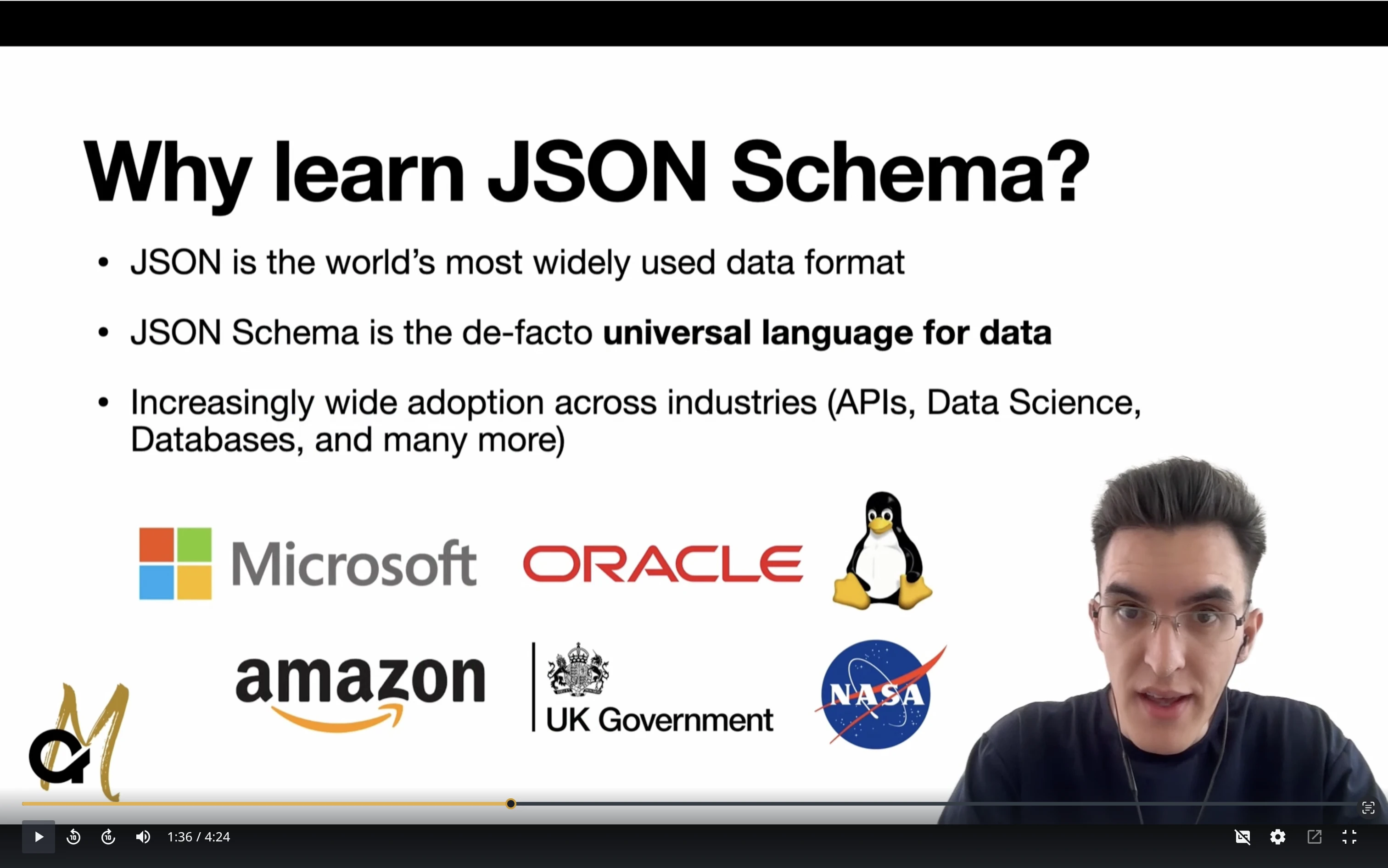$ref : URI Reference
$ref
URI ReferenceThis keyword is used to reference a statically identified schema.
| Value |
This keyword must be set to an absolute URI or a relative reference as defined by RFC 3986, where its fragment (if any) can consist of a JSON Pointer as defined by RFC 6901
Hint: Use the jsonschema metaschema and jsonschema lint commands to catch keywords set to invalid values
|
|---|---|
| Kind | Applicator |
| Applies To | Any |
| Base Dialect | 2020-12 |
| Changed In | Draft 6 2019-09 |
| Introduced In | Draft 3 |
| Vocabulary | Core |
| Specification | https://json-schema.org/draft/2020-12/json-schema-core.html#section-8.2.3.1 |
| Metaschema | https://json-schema.org/draft/2020-12/meta/core |
| Official Tests | |
| Default | None |
| Annotation | None |
| Affected By | |
| Affects | None |
| Also See |
|
The $ref keyword enables a schema to reference another schema by its URI,
effectively importing its keywords into the current evaluation process. This
keyword is the cornerstone of schema composition, allowing complex schemas to
be created out of simpler ones. A reference may set its URI fragment to a JSON
Pointer that determines the
destination of the reference after first resolving the rest of the URI.
Common Pitfall
Avoid referencing other schema files using their file paths. While some
implementations support this by automatically constructing schema URIs that
make use of the file:// scheme, this is not enforced behaviour. The only
standard and guaranteed mechanism of declaring a schema URI for identification
and referencing purposes is through the $id
keyword.
Common Pitfall
The target of a reference must be a schema. Referencing a JSON value that is
not unambiguously recognised as a schema leads to undefined behaviour. This
not only includes referencing arbitrary JSON files (the obvious case), but also
referencing parts of a schema that a JSON Schema evaluator does not consider to
be a subschema. For example, referencing the contents of the examples keyword.
References are either internal (pointing at schemas within the same schema
definition) or external (pointing at schema resources outside the given
schema definition). If the reference is a relative URI, it is resolved against
the current base URI, which is either the closest parent URI as set by the
$id keyword, or the base URI as determined
by the context on which the schema is declared. Schema wrappers like OpenAPI
are notable examples of the latter. A relative reference from a schema embedded
in an OpenAPI specification is resolved from the root of the API specification,
and not from the root of the schema.
Best Practice
It is highly recommended to make use of external references to break down complex monolithic schemas into smaller schema files. However, for performance and integrity reasons, avoid resolving these external schemas (i.e. over HTTP or the filesystem) at runtime.
You can automatically inline external references at build time using the
jsonschema bundle
command.
Note that a reference to an absolute URI does not necessarily mean that the
reference is external. Conversely, a reference to a relative URI does not
necessarily mean that the reference is internal. When encountering any type of
reference, a JSON Schema implementation will check if the root schema resource
or its nested schema resources (if any) declare the canonically resolved
version of such URI through keywords such as $id and $anchor. If so, the reference
is considered internal. This internal-first lookup is what enables the standard
bundling
process.
Digging Deeper
If you are having a hard time understanding references and some of its more subtle scenarios (like base URI resolution), it is probably because you don’t have a strong grasp of URIs yet (a notably hard but universal pre-requisite!).
To learn more about URIs, we strongly suggest studying the IETF RFC 3986 URI standard. To avoid confusion, note that there is also a WHATWG URL Standard that targets URLs in the context of web browsers. However, JSON Schema only implements and expects the IETF original standard. As a notable extension, this keyword supports referencing specific parts of a schema through the use of a JSON Pointer, so we also recommend studying the IETF RFC 6901 JSON Pointer standard and its URI fragment identifier representation.
To debug references and how JSON Schema is interpreting your relative URIs, try
the jsonschema inspect
command. This command prints detailed information about each schema reference
and of each location of the schema. For example:
$ jsonschema inspect schema.json
...
(REFERENCE) ORIGIN: /properties/foo/$ref
Type : Static
Destination : https://example.com/schemas/example#/$defs/uuid
- (w/o fragment) : https://example.com/schemas/example
- (fragment) : /$defs/uuid
...
Examples
{
"$schema": "https://json-schema.org/draft/2020-12/schema",
"$id": "https://example.com/my-schema",
"properties": {
"byRelativeFragmentPointer": {
"$ref": "#/$defs/helper"
},
"byAbsoluteFragmentPointer": {
"$ref": "https://example.com/my-schema#/$defs/helper"
},
"byRelativeURI": {
"$ref": "my-helper"
},
"byRelativeRootPathURI": {
"$ref": "/my-helper"
},
"byRelativeBackslashURI": {
"$ref": "my-schema/../my-helper"
},
"byAbsoluteURI": {
"$ref": "https://example.com/my-helper"
}
},
"$defs": {
"helper": {
"$id": "my-helper",
"type": "string"
}
}
}{
"$schema": "https://json-schema.org/draft/2020-12/schema",
"$id": "https://example.com/my-schema",
"properties": {
"byAbsoluteURI": {
"$ref": "https://example.com/my-other-schema"
},
"byRelativeURI": {
"$ref": "my-other-schema"
},
"byRelativeRootPathURI": {
"$ref": "/my-other-schema"
},
"byRelativeBackslashURI": {
"$ref": "my-schema/../my-other-schema"
}
}
}{
"$schema": "https://json-schema.org/draft/2020-12/schema",
"properties": {
"byAbsoluteURI": {
"$ref": "urn:example:my-other-schema"
}
}
}